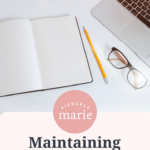This post may contain affiliate links. Full disclosure policy

From Marie — Today, I’m handing my blog over to Peggy Doviak, a friend and a Certified Financial Planner, who is sharing some of her tried and true wisdom for achieving financial stability, especially in times of uncertainty. As we’re heading into new year, this seems like a timely topic!
The importance for a woman to have a handle on her finances can be a make-it-or-break topic for quality of life. I’ve found Peggy’s advice in the past to be invaluable. Her articles and books are extremely informative while still actionable and easy to digest. In fact, she’s just about to release a book that I have already ordered for myself, 52 Weeks to Well-Being–What a Woman Needs To Know To Become Queen of Her Finances.
You may remember Peggy sharing her financial wisdom in other posts about when we can afford to retire, how to curb holiday spending, and setting and achieving financial goals – all set around financial stability. Peggy’s guest blog posts have been among our most popular on the site, and for good reason. They are just chock full of wisdom and sound advice – and today’s is no exception! I’m pleased to be able to share this space with Peggy, so she can share with you!
Happy New Year! I hope 2022 is joyful, safe, and peaceful for all of us. I’ve written many New Year’s articles, but I don’t want to talk about resolutions this time. Instead, I want to share ways of creating financial strategies for weathering unexpectedly hard times. COVID-19 caught many people unprepared, and few of us have navigated the last two years without pain.
Financial Stability: Keeping on Your Toes, Job-Wise
One financial crisis of the pandemic was soaring unemployment rates. The losses were devastating to people who thought their jobs were secure. Even though most individuals have found new jobs or returned to work, the situation shows the importance of keeping your career skills current.
First, review your resume. Resumes are more focused today than in the past, so you want to list experiences that generally correspond to the jobs you are seeking. Then, ask a few people who know your skills to provide references. Make sure they know you aren’t about to resign, or you might start rumors! Additionally, never list references without asking their permission first.
Further, If your resume needs an upgrade, invest in yourself and take a class. Virtual coursework has become easy to access during the last two years, and learning something new or refreshing your current abilities will make you more employable. If you’re still not comfortable in a virtual world, that subject is a great place to start, as I think technology will continue to dominate the workplace.
Financial Stability: Paying Off Debt, One Way or Another
A second New Year’s strategy is paying off debt. In financially uncertain times, monthly payments and interest can strain your cash flow. Additionally, fewer liabilities help your credit score. However, starting the process of paying off debt can be daunting.
Some financial experts recommend tackling the bill with the highest interest rate first. That’s a prudent strategy; however, you need to pay off your debt in a way that keeps you motivated. If you would rather eliminate several small bills before addressing a higher-rate credit card, that’s fine. You’ll incur a little more in interest, but what matters is that you’re making progress. Reducing debt is fantastic—I don’t care how you do it!

Maintaining: A Plan for a Cushioned Emergency Fund
A third strategy is saving an emergency fund. After COVID, I am more concerned about people’s emergency funds than previously. Before the pandemic, if someone held a long-term, stable job, I might not be concerned if they had enough cash to pay for more than a couple of months of expenses.
However, after what we’ve been through, I don’t think it’s enough. I think we all need substantial money in the bank, and the rule of thumb is six to nine months’ worth of your living costs.
When I tell people they need to save six months of bills, their eyes glaze over. They laugh, look down, and hope I’ll change the subject. Six months of expenses seem unattainable if you don’t have any money in savings. But don’t give up; I have a plan for you.
Steps to Building a 6-Month Emergency Fund

First, I want you to calculate your monthly bills. Look at the actual costs rather than estimating because most assumptions are too low. Include groceries and everything you would need to live. Once you’re sure of the amount, divide that number by two.
That’s right—don’t multiply it by six. Divide it by two. That’s the amount you will need to save to have two weeks of your bills in savings. The number may be high, but it isn’t unachievable for most people.
As you’re saving money, don’t think you have to be putting back large amounts each month. Of course, the more you save, the more quickly you will achieve your two-week goal. But maybe you only have an extra $25 to save each month. You may think it’s not enough, so you don’t even try. That’s the wrong way to look at it. Like paying off debt, the most critical part of saving money is starting.
Once you have banked two weeks of your bills, celebrate! Now, do it again and again until you have saved at least six months’ worth. Even if it takes you a year to compile the first two weeks, you’ll be more financially stable than many people at that point. Once you have a months’ worth of bills in the bank, you have enough for tires or a new dryer if something goes wrong. Remember, if you have to use your savings for an unexpected expense, begin replacing it immediately.
One final tip will help your emergency fund be successful. Keep your money in a bank account without a debit card. That way, you can withdraw it whenever it’s needed, but you won’t spend it without thinking. You could even open a savings account at another bank to make your money even more difficult to access.
Financial Stability: Planning for End of Life

The final financial strategy is a bit somber. Review your life insurance policies and your estate documents to determine they are adequate and up to date. No one likes thinking about their mortality, but having your affairs in order is the last gift you can give the people you love.
Carrying enough life insurance can help your family retain their home and way of life. Your benefit amount should be calculated with a financial planner and based on your monthly expenses, your partner’s salary, and the impact of losing your paycheck in that equation. I would encourage you to err on the side of having more than enough insurance. If your family loses you, they may not feel up to cooking for six months, or they may run into funeral expenses or other unexpected costs. Building in a bit of surplus can help fill that gap.
Additionally, review your estate plan with the help of an attorney. Do you need a trust, or is your current document up to date? Does your will leave your possessions to the people you want to have them? Have there been any marriages, deaths, or divorces since you created the documents? Have you had any children who would need a named caregiver? Remember, if you don’t appoint a guardian for your child, the court system will decide.
Further, do you have powers of attorney for healthcare and finance, and are they current? Do the people you listed know they will hold the role? Never give someone a task like this without telling them. And finally, do you have an advanced directive, also called a living will, where you choose your end-of-life care? You don’t want to stress the people you love.
This new year, getting your finances organized will make it easier if you hit unexpected problems in the future. Even though there is some light at the end of the COVID tunnel, you still need to look for potential pitfalls. I hope these strategies provide you with a starting place for a prosperous 2022!



